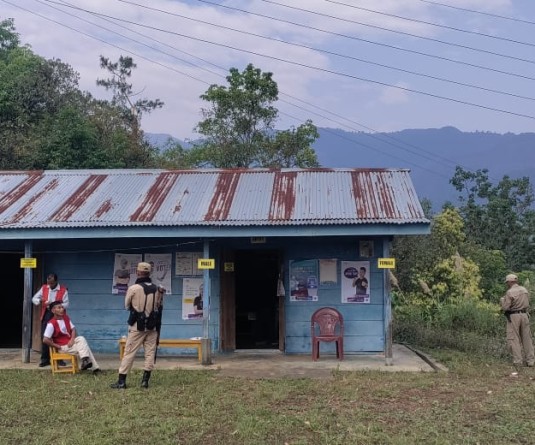
NEW DELHI, July 6 (Reuters): The government’s indecision over whether to create a new state of Telangana risks causing more unrest if other regions demand autonomy, and has further exposed the ruling Congress party as divided and rudderless. Bowing to demands for the new state carved out of Andhra Pradesh will not only make Congress less popular in other parts of the ruling party stronghold, but is also likely to lead to more autonomy agitations from areas such as Darjeeling.
Since independence in 1947, successive governments have carefully dealt with demands for new states -- creating three in 2000 -- while ensuring demands did not spiral enough to threaten the integrity of a nation of 1.2 billion people with hundreds of languages, ethnicities and castes. Congress’ foot-dragging over the four-decade old demand, reinforcing its appearance as a drifting party unable to make important decisions, has seen popular support for autonomy soar and a two-day strike against the government this week.
“(The Congress) promised a separate Telangana state without thinking through the implications,” wrote the Times of India on Wednesday. “That’s why it’s caught between a rock and a hard place now.” Andhra Pradesh sends 32 Congress MPs to parliament, more than any other state. Congress won there at the last two elections on a pro-Telangana ticket, but has since backtracked, angering its local coalition partner.
Creating Telangana would deeply damage the party’s popularity in the rest of Andhra Pradesh, while reneging would destroy its support in the area that wants to be its own state. Bowing to the agitation may fan similar demands elsewhere, such as the Gorkhaland region of West Bengal, headquartered in Darjeeling, or even lead to a large-scale rethink of states. But continued inaction is likely to see Congress lose voters on both sides of the argument, as it struggles under the weight of corruption charges that have stymied reform attempts in Asia’s third-largest economy.
India’s internal borders were last altered in 2000, with the creation of three new states in economically less developed areas in the north of the country. The last re-drawing before that took place in 1957. The country’s 28 states account for 1.2 billion people, compared with 50 U.S. states for a population of over 310 million. The most populous, Uttar Pradesh, would have the world’s fifth largest population were it a country.
Business were shut and thousands of police were deployed in Hyderabad, the capital of Andhra Pradesh and the Indian base for Microsoft and Google, as protesters demanding the formation of Telangana took to the streets this week. Autonomy activists say the Telangana region has been neglected by successive governments and trails other regions in terms of development. Many political analysts see a need to redraw India’s state boundaries, and say Telangana could be the starting point.
“It’s inevitable that Telangana state would spark similar calls elsewhere,” said independent political columnist Paranjoy Guha Thakurta. At the top of the list would be Gorkhaland, where a heavily Nepali-influenced ethnic group has demanded devolved power for over a hundred years, turning violent in the 1980s.
If demands for autonomy grew more strident there, Congress would again be caught in a no-win situation, with key coalition partner and state chief minister Mamata Banerjee strongly opposed.
Constitutionally, states bow to New Delhi, but economic growth has empowered local assemblies, and the rise of regional political heavyweights controlling vote blocs means the central government sometimes struggles to assert itself. In many states, maverick politicians campaigning on local issues have unseated the major national players, winning large numbers of seats in New Delhi that parties such as Congress are forced to woo in order to form stable coalitions.
The rise of Banerjee in West Bengal and Mayawati in Uttar Pradesh -- two of India’s most important political states -- is indicative of a trend that has seen concessions and policy influence handed out by the centre in exchange for votes. “The Congress party has handled this issue badly,” said B.G. Verghese of the New Delhi-based Centre for Policy Research. “There is certainly going to be pressure from other states.”
Consultations on: Union Home Minister
New Delhi, July 6 (PTI): With lawmakers raising the pitch for a separate Telangana, Centre on Wednesday said consultations were on and hoped the process would help it reach a final decision even as it ruled out suggestions of President’s Rule in Andhra Pradesh. “The status as of today is consultation process is still continuing. No decision has been taken yet,” Home Minister P. Chidambaram told reporters here when asked about the demand for a separate Telangana state. He ruled out suggestions of imposition of President’s Rule in Andhra Pradesh, where over 100 legislators have submitted their resignations to press for their demand for a separate Telengana state. “We are not thinking of President’s Rule....We hope that the process of consultations will show us the path to reach a conclusion,” Mr. Chidambaram said. Expressing unhappiness over the spate of resignations by MLAs and MPs from the region, he said the Centre would engage them in discussions. The Telangana Political Joint Action Committee has called for the 48-hour bandh to impress upon the Centre the immediate need to carve out a separate state of Telangana, which will be followed by a rail roko on July 8 and 9.




